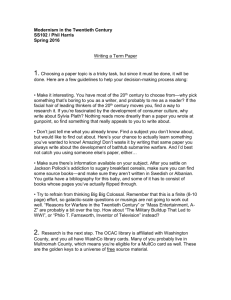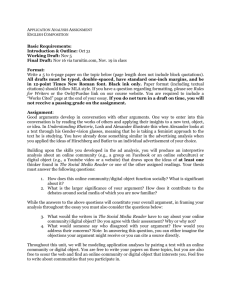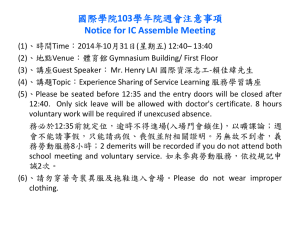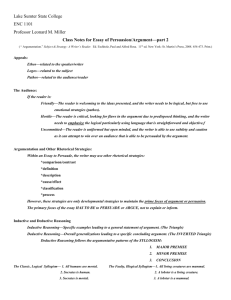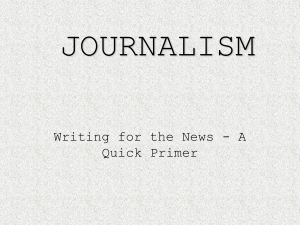Developing your critical writing
advertisement
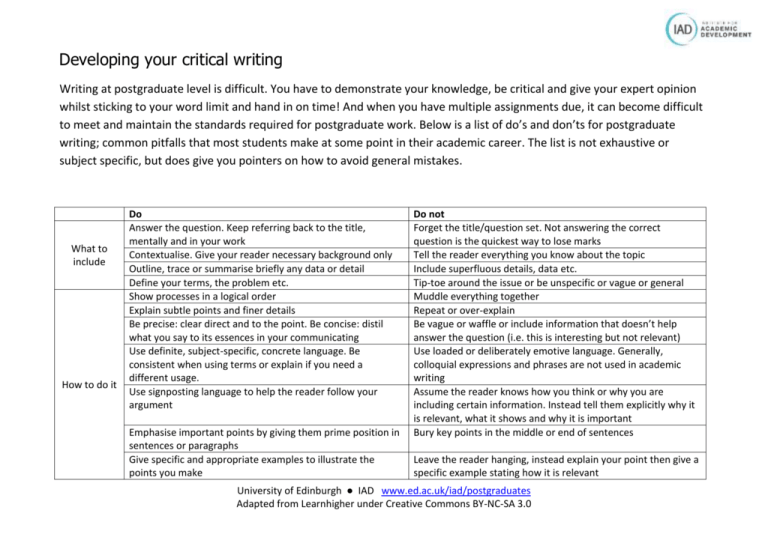
Developing your critical writing Writing at postgraduate level is difficult. You have to demonstrate your knowledge, be critical and give your expert opinion whilst sticking to your word limit and hand in on time! And when you have multiple assignments due, it can become difficult to meet and maintain the standards required for postgraduate work. Below is a list of do’s and don’ts for postgraduate writing; common pitfalls that most students make at some point in their academic career. The list is not exhaustive or subject specific, but does give you pointers on how to avoid general mistakes. What to include How to do it Do Answer the question. Keep referring back to the title, mentally and in your work Contextualise. Give your reader necessary background only Outline, trace or summarise briefly any data or detail Define your terms, the problem etc. Show processes in a logical order Explain subtle points and finer details Be precise: clear direct and to the point. Be concise: distil what you say to its essences in your communicating Use definite, subject-specific, concrete language. Be consistent when using terms or explain if you need a different usage. Use signposting language to help the reader follow your argument Emphasise important points by giving them prime position in sentences or paragraphs Give specific and appropriate examples to illustrate the points you make Do not Forget the title/question set. Not answering the correct question is the quickest way to lose marks Tell the reader everything you know about the topic Include superfluous details, data etc. Tip-toe around the issue or be unspecific or vague or general Muddle everything together Repeat or over-explain Be vague or waffle or include information that doesn’t help answer the question (i.e. this is interesting but not relevant) Use loaded or deliberately emotive language. Generally, colloquial expressions and phrases are not used in academic writing Assume the reader knows how you think or why you are including certain information. Instead tell them explicitly why it is relevant, what it shows and why it is important Bury key points in the middle or end of sentences Leave the reader hanging, instead explain your point then give a specific example stating how it is relevant University of Edinburgh ● IAD www.ed.ac.uk/iad/postgraduates Adapted from Learnhigher under Creative Commons BY-NC-SA 3.0 Show your reading and knowledge base by citing and referencing up to date and appropriate references Develop your argument to reflect your actual reading and research Analyse and discuss issues, looking at pros/cons, strengths/weaknesses, patterns/trends, connections and complexities Aim to propose a convincing theory/conclusion with some input of your own derived from your own research/reading Anticipate and account for weaknesses in your own argument rather than leave them for your reader to criticise. Pointing out your own faults will show thoroughness Comment/pass judgement, giving a reasoned opinion based on sound evidence Consider and evaluate others’ ideas, whether they align with yours or not Reject and refute others’ theories if you find them unconvincing after thorough research Make recommendations according to the results of your study and findings Copy and paste from text books, articles etc. Refer to anything you have not read yourself. You don’t know if you/someone else has understood or interpreted the information correct or in what context it might be being used in Decide what to think first and then twist facts or be selective when using references. Instead consider the whole topic/subject/argument Make assumptions and unproven generalisations, especially from only anecdotal evidence or personal experience Rely solely on other people’s work and conclusions Ignore or overlook faulty logic or gaps in your own or others’ work Write descriptive and repetitious comments rather than giving an opinion Ignore opposing arguments, this will weaken your own Agree with or unquestioningly accept information, argument, theory etc. of others’ just because they seem like an authoritative source Preach or rant at your reader, no one likes being told what to do. Instead present them with a logical argument and convincing examples to persuade them University of Edinburgh ● IAD www.ed.ac.uk/iad/postgraduates Adapted from Learnhigher under Creative Commons BY-NC-SA 3.0
![Program`s Dynamic Criteria Map (DCM)[1]](http://s3.studylib.net/store/data/007112770_1-0a2faad44b8e94d6ea99c5f4cbf00e83-300x300.png)

